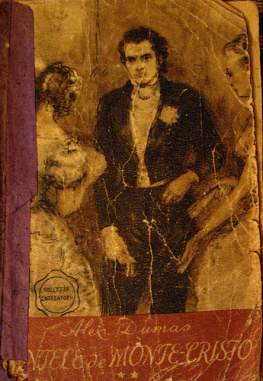T owards the end of the year 1665, on a fine autumn evening, there was a considerable crowd assembled on the Pont-Neuf where it makes a turn down to the rue Dauphine. The object of this crowd and the centre of attraction was a closely shut, carriage. A police official was trying to force open the door, and two out of the four sergeants who were with him were holding the horses back and the other two stopping the driver, who paid no attention to their commands, but only endeavoured to urge his horses to a gallop. The struggle had been going on same time, when suddenly one of the doors violently pushed open, and a young officer in the uniform of a cavalry captain jumped down, shutting the door as he did so though not too quickly for the nearest spectators to perceive a woman sitting at the back of the carriage. She was wrapped in cloak and veil, and judging by the precautions she, had taken to hide her face from every eye, she must have had her reasons for avoiding recognition.
Sir, said the young man, addressing the officer with a haughty air, I presume, till I find myself mistaken, that your business is with me alone; so I will ask you to inform me what powers you may have for thus stopping my coach; also, since I have alighted, I desire you to give your men orders to let the vehicle go on.
First of all, replied the man, by no means intimidated by these lordly airs, but signing to his men that they must not release the coach or the horses, be so good as to answer my questions.
I am attending, said the young man, controlling his agitation by a visible effort.
Are you the Chevalier Gaudin de Sainte-Croix?
I am he.
Captain of the Tracy, regiment?
Yes, sir.
Then I arrest you in the kings name.
What powers have you?
This warrant.
Sainte-Croix cast a rapid glance at the paper, and instantly recognised the signature of the minister of police: he then apparently confined his attention to the woman who was still in the carriage; then he returned to his first question.
This is all very well, sir, he said to the officer, but this warrant contains no other name than mine, and so you have no right to expose thus to the public gaze the lady with whom I was travelling when you arrested me. I must beg of you to order your assistants to allow this carriage to drive on; then take me where you please, for I am ready to go with you.
To the officer this request seemed a just one: he signed to his men to let the driver and the horses go on; and, they, who had waited only for this, lost no time in breaking through the crowd, which melted away before them; thus the woman escaped for whose safety the prisoner seemed so much concerned.
Sainte-Croix kept his promise and offered no resistance; for some moments he followed the officer, surrounded by a crowd which seemed to have transferred all its curiosity to his account; then, at the corner of the Quai de dHorloge, a man called up a carriage that had not been observed before, and Sainte-Croix took his place with the same haughty and disdainful air that he had shown throughout the scene we have just described. The officer sat beside him, two of his men got up behind, and the other two, obeying no doubt their masters orders, retired with a parting direction to the driver.
The Bastille!
Our readers will now permit us to make them more fully acquainted with the man who is to take the first place in the story. The origin of Gaudin de Sainte-Croix was not known: according to one tale, he was the natural son of a great lord; another account declared that he was the offspring of poor people, but that, disgusted with his obscure birth, he preferred a splendid disgrace, and therefore chose to pass for what he was not. The only certainty is that he was born at Montauban, and in actual rank and position he was captain of the Tracy regiment. At the time when this narrative opens, towards the end of 1665, Sainte-Croix was about twenty-eight or thirty, a fine young man of cheerful and lively appearance, a merry comrade at a banquet, and an excellent captain: he took his pleasure with other men, and was so impressionable a character that he enjoyed a virtuous project as well as any plan for a debauch; in love he was most susceptible, and jealous to the point of madness even about a courtesan, had she once taken his fancy; his prodigality was princely, although he had no income; further, he was most sensitive to slights, as all men are who, because they are placed in an equivocal position, fancy that everyone who makes any reference to their origin is offering an intentional insult.
We must now see by what a chain of circumstances he had arrived at his present position. About the year 1660, Sainte-Croix, while in the army, had made the acquaintance of the Marquis de Brinvilliers, maitre-de-camp of the Normandy regiment.
Their age was much the same, and so was their manner of life: their virtues and their vices were similar, and thus it happened that a mere acquaintance grew into a friendship, and on his return from the field the marquis introduced Sainte-Croix to his wife, and he became an intimate of the house. The usual results followed. Madame de Brinvilliers was then scarcely eight-and-twenty: she had married the marquis in 1651-that is, nine years before. He enjoyed an income of 30,000 livres, to which she added her dowry of 200,000 livres, exclusive of her expectations in the future. Her name was Marie-Madeleine; she had a sister and two brothers: her father, M. de Dreux dAubray; was civil lieutenant at the Chatelet de Paris. At the age of twenty-eight the marquise was at the height of her beauty: her figure was small but perfectly proportioned; her rounded face was charmingly pretty; her features, so regular that no emotion seemed to alter their beauty, suggested the lines of a statue miraculously endowed with life: it was easy enough to mistake for the repose of a happy conscience the cold, cruel calm which served as a mask to cover remorse.
Sainte-Croix and the marquise loved at first sight, and she was soon his mistress. The marquis, perhaps endowed with the conjugal philosophy which alone pleased the taste of the period, perhaps too much occupied with his own pleasure to see what was going on before his eyes, offered no jealous obstacle to the intimacy, and continued his foolish extravagances long after they had impaired his fortunes: his affairs became so entangled that the marquise, who cared for him no longer, and desired a fuller liberty for the indulgence of her new passion, demanded and obtained a separation. She then left her husbands house, and henceforth abandoning all discretion, appeared everywhere in public with Sainte-Croix. This behaviour, authorised as it was by the example of the highest nobility, made no impression upon the. Marquis of Brinvilliers, who merrily pursued the road to ruin, without worrying about his wifes behaviour. Not so M. de Dreux dAubray: he had the scrupulosity of a legal dignitary. He was scandalised at his daughters conduct, and feared a stain upon his own fair name: he procured a warrant for the arrest of Sainte-Croix wheresoever the bearer might chance to encounter him. We have seen how it was put in execution when Sainte-Croix was driving in the carriage of the marquise, whom our readers will doubtless have recognised as the woman who concealed herself so carefully.





